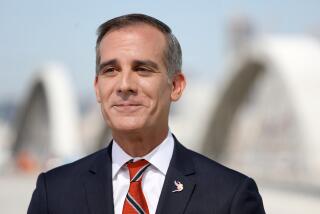A New CIA Director--and a New Challenge : Gates’ likely confirmation won’t alter need for revised focus
The Senate appears headed toward confirming Robert M. Gates as director of Central Intelligence, probably by a comfortable margin following the Intelligence Committee’s 11-4 vote in his favor.
The Gates hearings--long, at times remarkably detailed and often contentious--saw a number of major allegations raised to challenge the fitness of the former CIA deputy. The most serious of these was that for ideological reasons he had allowed or encouraged a distortion of certain intelligence information that the agency provided to policy-makers.
The gravity of such charges can’t be understated. A President and his foreign-policy advisers face the need to make countless decisions about issues where clarity is often elusive and certitudes nonexistent. The intelligence that guides many of these decisions must be as factually accurate as possible. Where analysis is involved, where the meaning of events is assessed and forecasts are ventured, the integrity of that analysis must be above suspicion. Far too much--including possibly billions in government spending, many lives and perhaps even the nation’s security--is at stake to permit anything less than complete political independence in the product that the CIA provides.
Gates was accused by several former and present CIA employees of skewing certain analyses in order to pander to the conservative biases of his boss, the late William J. Casey. Gates, and supporting witnesses, rebutted these allegations in detail and, we think, for the most part convincingly. In the end the case made against Gates could not be held to be disqualifying. In the end the committee had no solid reasons not to recommend confirmation.
But the Intelligence Committee’s interest properly extended far beyond what Gates may have done in the past. Of foremost concern is how quickly and effectively the CIA can reorient itself to meet altered strategic requirements in a world being swept by radical political change.
Gates and the committee agree on the compelling need for such a refocusing of resources and energies. Since its founding in the late 1940s, the CIA has concentrated on trying to unlock the military, political and economic secrets of the communist world, especially the Soviet Union, because the communist bloc countries posed the main strategic threat to the United States and its friends.
The sudden and historic erosion of that threat has cleared the way for a significant shifting of resources, to bring under fresh scrutiny those potentially threatening countries and possibly destabilizing problems that for too long have been neglected by U.S. intelligence agencies. While no one can foretell the future, the likelihood is great that for some time to come the major threats to international peace are most likely to arise from certain Third World countries, like Iraq. Better intelligence on these states is no longer a luxury--if in fact it ever was--but an urgent need. Some in the Senate have wondered if Gates, most of whose professional career has been as a Soviet specialist in the CIA, is the best man to oversee the reorientation. He says he is. Soon he likely will have the chance to show what he can do.
More to Read
Sign up for Essential California
The most important California stories and recommendations in your inbox every morning.
You may occasionally receive promotional content from the Los Angeles Times.








